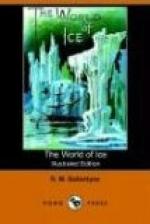But he was prevented from putting this intention into practice by a hurricane which burst over the Arctic Regions with inconceivable bitterness, and for two days kept all the inhabitants of the snow-village confined to their huts. This hurricane was the fiercest that had swept over these bleak regions of ice since the arrival of the Dolphin. The wind shrieked as it swept round the cliffs, and down the ravines, and out upon the frozen sea, as if a legion of evil spirits were embodied and concentrated in each succeeding blast. The snow-drift rose in solid masses, whirled madly round for a few seconds, and then was caught by the blast and swept away like sheets of white flame. The thermometer stood at 25 deg. below zero, a temperature that was mild compared with what it usually had been of late, but the fierce wind abstracted heat from everything exposed to it so rapidly that neither man nor beast could face it for a moment. Buzzby got a little bit of his chin frozen while he merely put his head out at the door of the hut to see how the weather looked; and Davie Summers had one of his fingers slightly frozen while in the act of carrying in one of the muskets that had been left outside by mistake.
As for the Esquimaux, they recked not of the weather. Their snow-huts were warm, and their mouths were full, so like wise men and women they waited patiently within doors till the storm should blow itself out. The doings of these poor people were very curious. They ate voraciously, and evidently preferred their meat raw. But when the sailors showed disgust at this, they at once made a small fire of moss mingled with blubber, over which they half-cooked their food.
Their mode of procuring fire was curious. Two small stones were taken—one a piece of white quartz, the other a piece of iron-stone—and struck together smartly. The few sparks that flew out were thrown upon a kind of white down, found on the willows, under which was placed a lump of dried moss. It was usually a considerable time before they succeeded in catching a spark; but, once caught, they had no difficulty in blowing it into a flame.
They had also an ingenious contrivance for melting snow. This was a flat stone, supported by two other stones, and inclined slightly at one end. Upon this flat stone a lump of snow was placed, and below it was kindled a small fire of moss and blubber. When the stone became heated, the snow melted and flowed down the incline into a small seal-skin cup placed there to catch it.
During the continuance of the storm the sailors shared the food and lodging of these Esquimaux. They were a fat, oily, hospitable, dirty race, and vied with each other in showing kindness to those who had been thus thrown into their society. As Davie Summers expressed it, “they were regular trumps;” and according to Buzzby’s opinion, “they wos the jolliest set o’ human walruses wot he had ever comed across in all his travels; and he ought to know, for he had always kep’ his weather-eye open, he had, and wouldn’t give in on that p’int, he wouldn’t, to no man livin’.”




